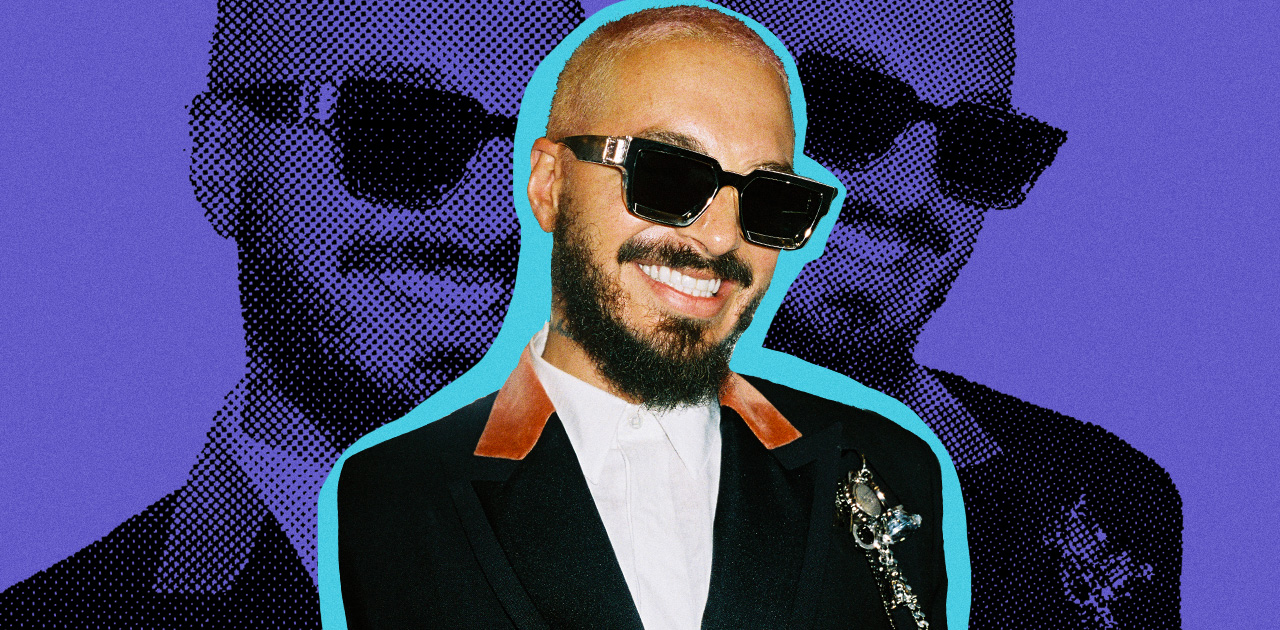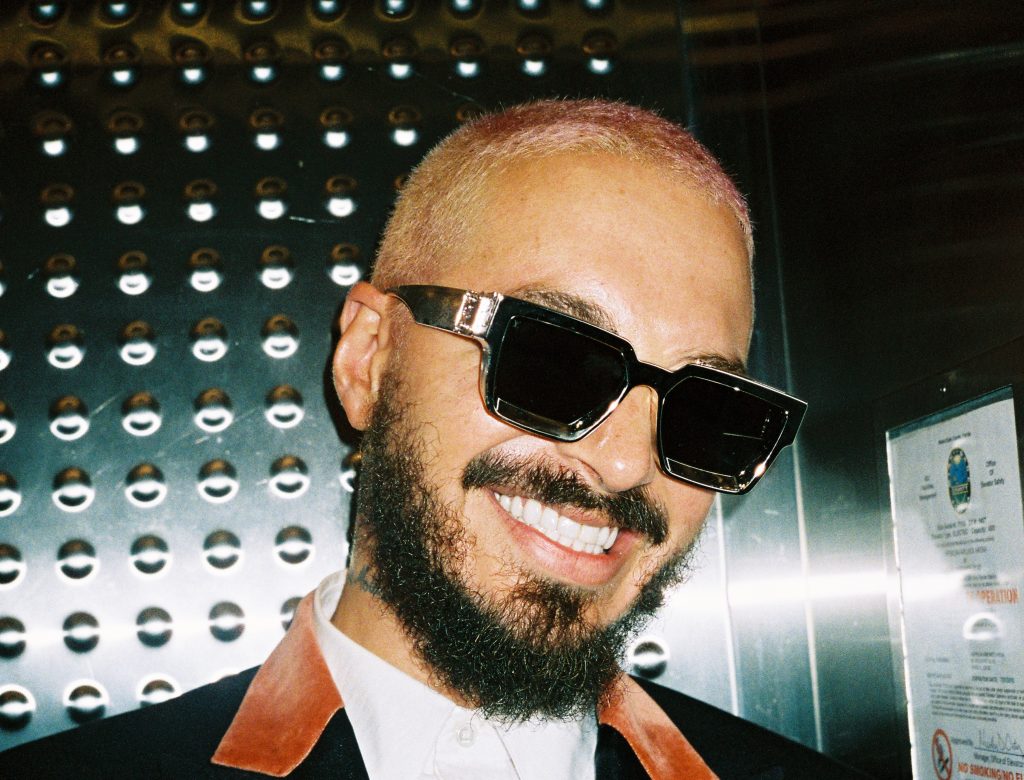José has on a pair of white socks he got at Paris Fashion Week when we chat. White with a touch of blue, yellow, green and red, that is. And, why not? He’s physically tapping into his latest album’s long-teased thesis statement, which should be taken at face value.
With Colores, J Balvin attempts to encapsulate the grand spectrum of life itself—his muse—in two fistfuls of songs. With the help of a mixed batch of producers, the result grazes the elements—namely, risk and reinvention—that enshrine successful experimental artists atop a table at the next level. Most, if not all, art—particularly when it comes to urbano nowadays—is a remixed or fancied take on what’s come before. Rather than harken back, Balvin appears laser-focused on the future. What takes an artist from basic to bracing lies in how much they push the genre forward or, in this case, tighten its grip to relevancy. Production grants him a probationary seat.
“Lo que quiero es reinventar la música Latina,” Balvin confidently says about what he hopes will come from Colores. He wants to reinvent Latin music. “We want to keep elevating the culture and make something bigger.”
That something, he believes, is the conceptual album at hand. At age 34, with reported hopes to become a billionaire and make an album that hosts his best work, J Balvin isn’t here to play. Or is he?
The luxuries of time and a lax creative environment—rid of what one can imagine to be innate pressures to succeed when millions of dollars are betting on you doing just that—I imagine, aren’t there. Yet, from the guitar riffs that carry the playful “Gris” to the closest we’ll get to a cortavenas reggaetón from the Paisa on “Rojo,” it feels like Balvin isn’t giving mind to all that. Aside from the likes of the club-friendly “Azul” that teleports you to Ibiza, Colores feels like an album one would make a couple of years into stardom rather than well over a decade into it, but perhaps that’s exactly what he intended it to be.
“Yo no me complico,” Balvin sing-speaks in the outro to his laidback, tone-setting opener, “Amarillo.”
The Oasis counterpart continues to reside in a sonic safe space that assures him pop star, global reach. His longtime producer Sky (Alejandro Ramirez), who finally takes center stage on the lush track “Verde,” catapulted Balvin to the frontline of ubrano with his own recognizable sound on Energía. Much of Sky’s creative input, like getting Marciano Cantero on “Un Peso” or Rosalía on Vibras, have kept the Medellín reggaetónero interesting. Now, Balvin knows it’s time for a refresh and is taking risks where it’s granted to yield results, whether that be now or later. He’s down to experiment, so he worked with a group he says adds to the diversity and color of the album. From Taiko (Chile) to Michael Brun (Haiti) and Dee Mad (Paris), Balvin chose a trusted roster of producers that added subtle, soul-saving touches of cool throughout.
Buena Vista Soicial Club’s “Chan Chan” echoing off the tailend of “Arcoíris,” for example, is a welcomed yet unexpected addition that felt natural to Brun. “My goal was thinking about in terms of connecting the world,” he told Rolling Stone about the song that’s been sitting in his cubby since before the release of “Como Un Bebé,” Balvin’s other feature with the Nigerian singer.

“Arcoíris” ties the project together in more ways than one, “Morado” provides an independent woman anthem, “Negro” is a sultry track with a toned down BPM and all in all the project is a 30-minute palatable concoction. It took over 30 colors/songs to land on what is now the final ten and Balvin isn’t expecting you to like them all.
“Of ten songs, if people like four… it’s a successful album [to me],” he tells Remezcla when asked how he determines whether or not an LP has hit it out the park.
“I’m gonna be a legend, that’s notorious, obvious” Balvin sings on “Negro.” Given his place in Colombian reggaetón’s history, presence on a live stage, record-breaking numbers and continued investment by way of his label, he isn’t wrong.
Colores is prime for Miami beach days, has a song that will undoubtedly resurge at the discoteque when we’re all allowed to sway our way into oblivion again and will likely make for an unparalleled live experience given Takashi Murakami’s brush stroke and the project’s multi-faceted creative direction—but it’s not a magnum opus by any means. There’s still work to do and he seems to be in just the right headspace to do so.
“I want to reinvent the idea of albums with concepts and create a new wave that refreshes,” he explains. “For me it’s like a rebirth, connecting me with my audience in a much different way, reinventing the sound, changing the production.”
Unleashed almost a week before its intended release date, Colores was/is meant to be a moment of respite and light amidst an uncertain time (to say the least). Balvin—who overtly addressed mental health struggles on and off stage over the last year—is aware that life isn’t always a ball of color. Though he missed the opportunity to touch on that reality on this sonic zine’s page, he hopes each color, track or “ataque de la vibra” as he calls it, will contrast and overpower the dark ones that inevitably bleed onto life’s pages.
“Hay niveles pa’ llegar,” Sky sings in his debut. “It’s a world of color,” Balvin confirms from an open balcony in the 305. Color and, hopefully, possibility.







